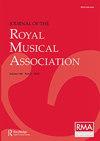统治复兴:安东·布鲁克纳在卢奇诺·维斯康蒂的《森索》中创作的第七交响曲(1954)
IF 0.5
2区 艺术学
0 MUSIC
引用次数: 0
摘要
在本文中,我认为安东·布鲁克纳的《第七交响曲》在卢奇诺·维斯康蒂(Luchino Visconti)的电影《森索》(Senso)(1954)中,通过政治信息的重新编码,在推进浪漫色彩的叙事中发挥了关键作用。维斯康蒂在这部影片中通过音乐的卓越作用,反映了威尼斯复兴时期的政治气候。布鲁克纳的音乐特别强调了威尼斯人在奥地利统治者统治下的状况,就像奥地利人对北意大利人的统治一样,是一种压迫和压倒一切的力量。布鲁克纳的音乐以瓦格纳式的风格为基础,从微观和宏观两方面传达了贯穿整部电影的背叛思想。这种背叛指的是基督教民主党,它将马克思主义党羽排除在战后意大利的治理之外。对维斯孔蒂来说,这些事件反映了19世纪资产阶级推动的复兴运动由于贵族的懒惰而失败的革命。通过维斯康蒂的马克思主义意识形态来解释,布鲁克纳因此是精英霸权仍然存在的一个指标,没有改变。作为奥地利君主制的声音代表,它反对资产阶级的复兴理想,保证统治阶级的至高无上。本文章由计算机程序翻译,如有差异,请以英文原文为准。
Domination over the Risorgimento: Anton Bruckner’s Seventh Symphony in Luchino Visconti’s Senso (1954)
Abstract In this article I argue that Anton Bruckner’s Seventh Symphony assumes a pivotal role in advancing the romantically tinged narrative in Luchino Visconti’s film Senso (1954) through a politically recoded message. Visconti offers in this film a reflection upon the political climate in Venetia during the Risorgimento through the pre-eminent role of music. In particular, Bruckner’s music emphasizes the condition of the Venetians under Austrian rulers by dominating as an oppressive and overpowering force, not unlike the Austrian supremacy over the north Italians. Bruckner’s music, which relies on a decisively Wagnerian idiom, conveys throughout the film ideas of betrayal, on both the microlevel and the macrolevel. Such betrayals refer to the Christian Democracy, which excluded the Marxist partisans from governing post-war Italy. These events mirror, for Visconti, the failed revolution of the bourgeois-driven Risorgimento in the 19th century due to the idleness of the aristocracy. Interpreted through Visconti’s Marxist ideology, Bruckner is thus an indicator that the hegemony of the elite remained in place, unchanged and unaltered. As the sonic representative of the Austrian monarchy, it opposes the Risorgimento ideal of the bourgeois class and reassures the supremacy of the ruling class.
求助全文
通过发布文献求助,成功后即可免费获取论文全文。
去求助
来源期刊
CiteScore
0.50
自引率
0.00%
发文量
16
期刊介绍:
The Journal of the Royal Musical Association was established in 1986 (replacing the Association"s Proceedings) and is now one of the major international refereed journals in its field. Its editorial policy is to publish outstanding articles in fields ranging from historical and critical musicology to theory and analysis, ethnomusicology, and popular music studies. The journal works to disseminate knowledge across the discipline and communicate specialist perspectives to a broad readership, while maintaining the highest scholarly standards.

 求助内容:
求助内容: 应助结果提醒方式:
应助结果提醒方式:


